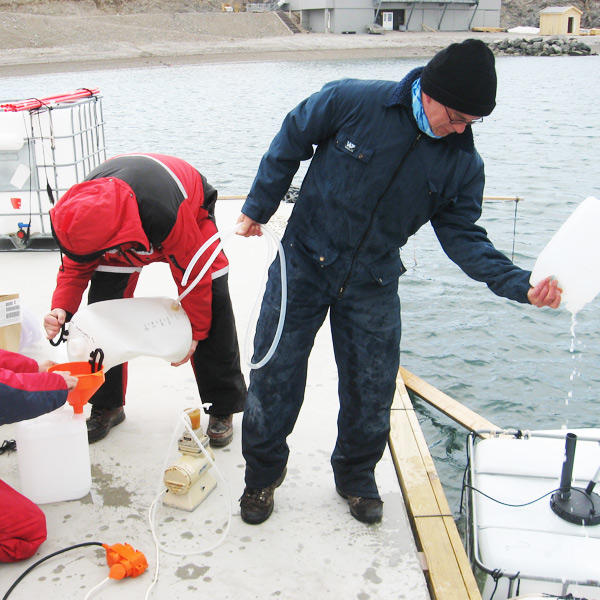Funded Research
Projects at Marine microbiology
Main content
We are involved in a number of projects that generally revolve around one or several of these questions:
How can we strengthen ties between research and education in viral ecology and evolution?
What are the mechanisms that control microbial diversity?
What are the mechanisms that control activity of microorganisms?
How is microbial diversity linked to food web structure and ecosystem function in the marine pelagic?
How does evolution blend with processes on ecological time scales to determine system dynamics and function of the marine microbial food web?
Ongoing projects:
- Aquacosm - Network of Leading European AQUAtic MesoCOSM Facilities Connecting Mountains to Oceans from the Arctic to the Mediterranean http://aquacosm.eu/
- Arctic Microorganisms
- CAVEICE
- CLIMAGAS – Investigations on the role of open system pingos in Arctic methane emissions.
- CONFECT - An interactive network to advance research and education in viral ecology and evolution (RCN Intpart)
- FunCab - https://www.uib.no/en/rg/EECRG/85396/funcab
- HAVOC Ridges - Safe Havens for ice-associated Flora and Fauna in a Seasonally ice-covered Arctic Ocean (a Norwegian partner in the MOSAiC campaign http://www.mosaicobservatory.org/). The main objective is to Understand the role of sea-ice ridges in the Arctic sea-ice system when the ice becomes thinner and level ice melts in summer
- METANOM High-throughput metabarcoding of eukaryotic diversity for environmental monitoring of marine sediments (PETROMAKS2) (RCN)
- MIXsTRUCT - Impact of mixotrophs on the structure of the marine pelagic food web (RCN MARINFORSK). The project aims to understand the role of mixotrophy for structuring marine pelagic food webs in order to obtain a more complete understanding of how microbial processes link to global scale elemental cycling.
- SIMPLEX - Self-Similarity in Ecosystem Organization – From Simple Laws of Microbial Ecology to Scale-Invariant Theory of Ecosystem Complexity (TMS Starting Grant)
- The Nansen Legacy (http://nansenlegacy.org) Integrated research project on climate and ecosystem change in the Barents Sea and adjacent Arctic Basin. The project is interdisciplinary and covers all aspects from physical processes to living resources. Ten Norwegian research institutions are involved in the project and our task is to understand the Arctic marine microbial food web structure and function.
- Virus-X - http://virus-x.eu/
- VIROVAC Filter-feeding mesozooplankton as uncharted accomplices in marine virus ecology (RCN FRIMEDBIO)
- VIRVAR Uncovering key players in regulating phytoplankton function and structure - Lessons to be learned from algal virus-haptophyte coexistence (RCN MARINFORSK). The project aims to understand different stages of virus-algae coexistence, using haptophytes as role models
Recently completed projects:
- HAPTODIV - Diversity and dynamics of marine Haptophytes.
- MERCLIM-BIO - Marine Ecosystem Response to a changing CLIMate.
- MESOAQUA
- METAOCEANS - Elucidating the structure and functioning of marine ecosystems through synthesis and comparative analysis (Marie Curie Early Stage Training Network).
- MICROBAIR - Quantification and Characterization of Microbial Communities in Air.
- MicroPolar - Processes and Players in Arctic Marine Pelagic Food Webs - Biogeochemistry, Environment and Climate Change https://www.facebook.com/themicropolarproject, http://micropolar.blogspot.no/.
- MICRACLES - Multi-product Integrated bioRefinery of Algae: from Carbon dioxide and Light Energy to high-value Specialties
- OCEAN-CERTAIN - Ocean Food-web Patrol - Climate Effects: Reducting targeted Uncertainties with an Interactive Network https://www.ntnu.edu/oceancertain https://www.facebook.com/oceancertain.
- MINOS - Microbial network organisation
- Nutrient Tunneling - Nutrient tunneling and other alternative pathways for mineral nutrients through the microbial food web to copepods.
- PAME-Nor - DOC turnover in polar microbial food webs.
- VIPMAP - Viral lysis and programmed cell death in marine phytoplankton.
- VIMPACT - Estimating viral impact and Cost of Resistance on marine phytoplantkon communities.
04.05.2021

